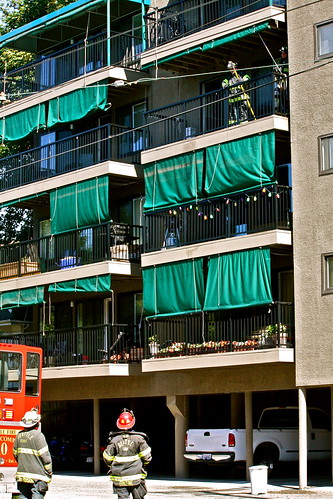
After three Capitol Hill fires in four days involving grills, representatives from the city tells CHS that living in our density friendly neighborhood doesn’t mean you have to be an outlaw to bbq.
If your building allows it, despite this scare-mongering piece from 2004 about the state’s building codes putting an end to grilling in Seattle, we’re told that the city’s fire code is what matters. And that code says you can bbq. Tonight, if you want to. Seattle Fire’s Kyle Moore says the city has no restrictions on charcoal grills. But the liquid propane end of things gets a little more restricted:
3803.4 Use of LP-gas containers on roofs or exterior balconies.LP-gas containers on roofs or exterior balconies shall be in accordance with Sections 3803.4.1 through 3803.4.2.
3803.4.1 LP-gas containers on roofs of buildings. LP-gas containers are prohibited on the roofs of buildings and parking garages. [NFPA 58 6.6.7.1]Exceptions:
1. Temporary installations at construction sites in accordance with Section 3803.5.
2. A single LP-gas container having an individual water capacity not exceeding 48 pounds [nominal 20 lb (9 kg) LP-gas] connected to a LP-gas grill.
3803.4.2 LP-gas containers on exterior balconies. LP-gas containers with a water capacity greater than 2.5 pounds (1 kg) shall not be located on decks or balconies above the first floor that are attached to a Group R-1 or R-2 occupancy. [NFPA 58 6.19.11.2]Exceptions:
1. LP-gas containers not exceeding a water capacity of 48 pounds (21.8 kg) [nominal 20 pounds (9 kg)
LP-gas] may be used on balconies served by outside stairways if only such stairways are used to transport the container.
2. A single LP-gas container having an individual water capacity not exceeding 48 pounds (21.8 kg) [nominal 20 pounds (9 kg) LP-gas] connected to a LP-gas grill may be located on each exterior balcony of any occupancy except Group R-2 that is licensed by the Washington State Department of Health and Social Services or Washington State Department of Health, if a portable fire extinguisher having a minimum rating of 20-B is located within 30 feet (9144 mm) of the grill.
Seattle Fire also asked us to check with DPD. The department’s Bryan Stevens said the city has considered making changes but at this point, you’re free to grill, grill grill. “We’ve taken that into consideration when we’ve amended the code, but we do not regulate it. Any regulations that apply are found within the Fire Code,” Stevens said.
That being said, at least one of the recent fires is a reminder to make sure your grill is never left unattended and that everything is turned off or shut down before you leave it. You might also consider having a fire extinguisher on hand when you’re putting more than your own living space at steak stake.



Well, this is a kick in the shorts. My comments yesterday explaining how the regs worked were based on information provided by our homeowners association insurance company. The City and State have conflicting regulations. So now we let our attorneys figure it out.
For now, let try this
HEY! DON’T LEAVE YOUR GRILLS UNATTENDED!
It seems crazy to have (reasonable) limits on LP but none on charcoal. LP are much more controlled and easier to extinguish.
I completely agree. My building actually doesn’t allow charcoal per the home owners regulations but gas is allowed, so I’m happy.
I’m surprised they don’t have tighter regulations on charcoal since drunk idiots tend to tip those over scattering incendiaries everywhere. There should be health and pollution regs on charcoal lighter fluid. That stuff is vile and you can smell it for blocks.
if you are cooking with bricks, use a damn chimney
http://www.amazon.com/Weber-7416-Rapidfire-Chimney-Starter/d
It all boils down to explosions.
The fire code rules make sense in scenarios like this: say you live in an apartment building. You have a little deck out there with a propane grill. Say the dude in the unit next to you and the guy above, and so on for what, six stories, has a propane grill too.
imagine if that building caught fire. You now have six explosive bombs blocking possible escape points. Which will also then explode, doing a TON of damage.
I suppose the explosions angle makes sense. But that seems like a remote possibility of making an already bad fire worse versus a much more likely scenario with charcoal starting a fire that wouldn’t otherwise have happened, via over-zealous lighter fluid use, uncontrolled flare-ups, flying ash, or being tipped over.